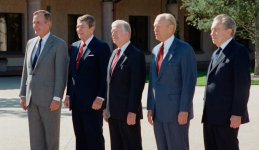signalmankenneth
Verified User
What spaceflight owes to Jimmy Carter: The president's little-known NASA legacy
The year was 1977 and then-President Jimmy Carter had a problem with NASA.
In a diary entry from that June, Carter, who died Sunday at age 100, made clear his displeasure with the agency, which was in the midst of building the space shuttle but had fallen years behind schedule.
“We continued our budget meetings. It’s obvious that the space shuttle is just a contrivance to keep NASA alive, and that no real need for the space shuttle was determined before the massive construction program was initiated,” Carter wrote, according to excerpts published in his 2010 book “White House Diary.”
Carter is hardly remembered as a champion of NASA. Unlike Presidents John F. Kennedy and Lyndon B. Johnson, he has no NASA center bearing his name, and his time in office wasn’t characterized by grand visions for astronomy or human spaceflight.
Yet, it was Carter who ultimately saved NASA’s space shuttle program — giving the country perhaps its most iconic space vehicle. And it is Carter’s words that have been journeying aboard the Voyager probes for more than 45 years, carrying a message of peace and hope deep into the cosmos.
“It doesn’t show up in any of the retrospectives of major accomplishments of his term in office, but one might call him an unsung hero for the space program,” said Valerie Neal, an emerita space history curator at the National Air and Space Museum.
Years before Carter took office, NASA was eyeing its next big endeavor. By the late 1960s, as the Apollo moon missions were ongoing, agency officials were contemplating new destinations, Neal said.
Consensus formed around trying to establish a presence in Earth orbit — a space station where astronauts could stay for longer periods and where researchers could learn about microgravity and its effects on the human body.
“But to build a space station, you need a new vehicle that can carry all the equipment into low-Earth orbit,” Neal said.
Enter the space shuttle.
NASA envisioned the shuttle having myriad functions. In addition to hauling space station modules and cargo into orbit, agency officials suggested it could launch satellites and other commercial payloads while also serving as its own temporary lab in space.
By the time Carter took office in January 1977, however, political appetites for the shuttle program were on thin ice. Carter himself didn’t see much value in sending astronauts into orbit, according to Neal.
“He approved of a lot of what NASA did in aeronautics and in planetary exploration, but he just didn’t see a strong reason for the space shuttle,” she said.
Five years earlier, President Richard Nixon had approved $5.5 billion for the nascent shuttle program. But the project’s budget had mushroomed in the intervening years, as engineers struggled with the design of the vehicle’s main engines and the thermal tiles that would protect the spacecraft as it re-entered Earth’s atmosphere.
“These were the first rocket engines that were designed to be used repeatedly, so they had to meet a very high certification standard,” Neal said. “NASA was having a lot of trouble with them.”
At that point, the project was at least three years behind schedule and some members of Congress started calling for the program to be scaled back or scrapped, she added. Carter was feeling pressure from within his administration: Officials with the Office of Management and Budget pushed to cut NASA's funding, and his vice president, Walter Mondale, was an outspoken critic of the space shuttle.
“NASA was taking a beating,” Neal said. “In 1977, ‘78 and ‘79, NASA just wasn’t in a good place in terms of public opinion.”
However, Carter rescued the shuttle by giving NASA the resources needed to see the project through to its inaugural launch in 1981. The president earmarked nearly $200 million in additional funds in 1979 and an extra $300 million the following fiscal year. At a time when inflation was sky-high and there was enormous pressure to tighten government spending, only the Defense Department and NASA saw their budgets increase in those years.
https://www.yahoo.com/news/spaceflight-owes-jimmy-carter-presidents-111044597.html









